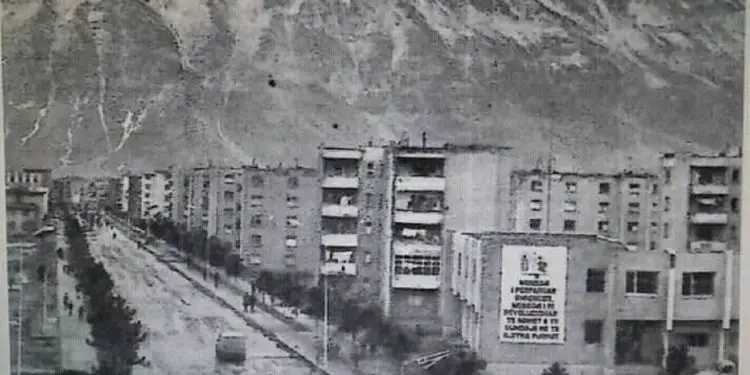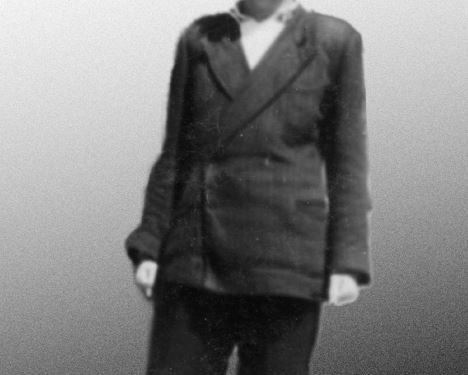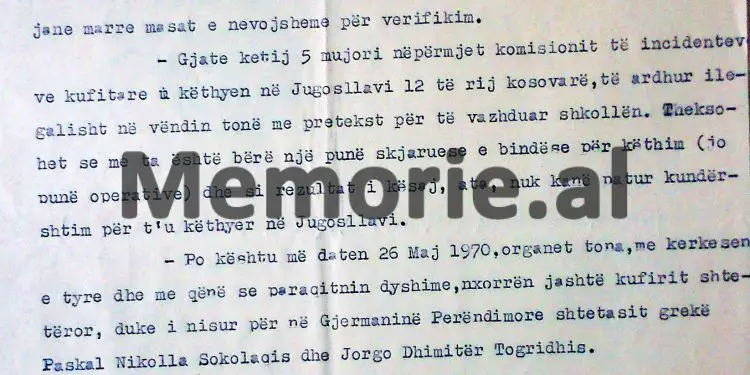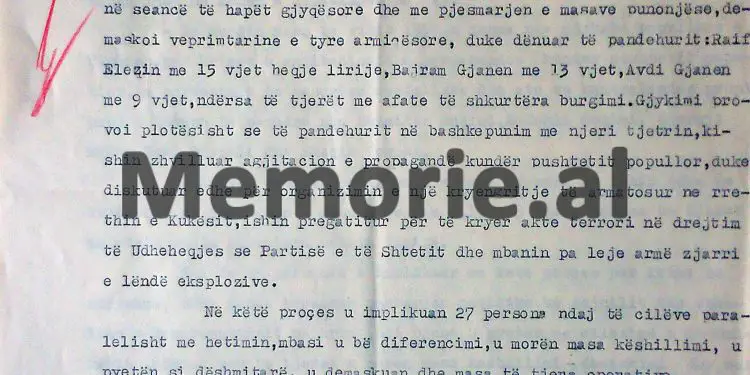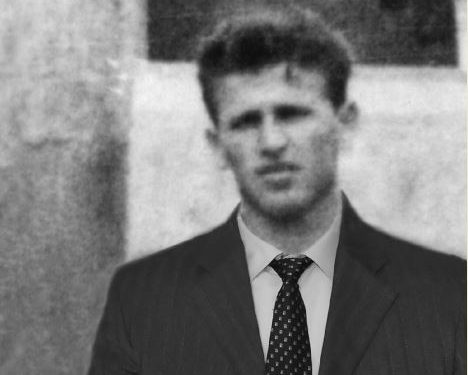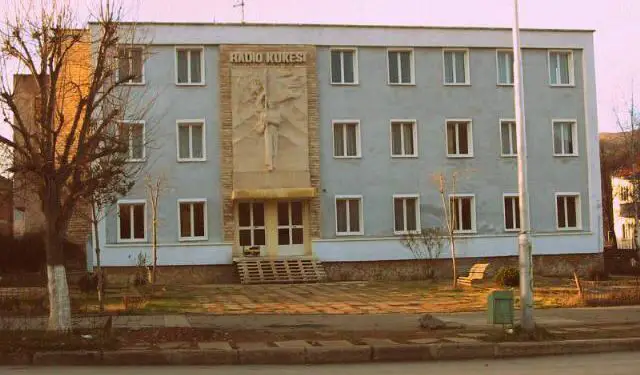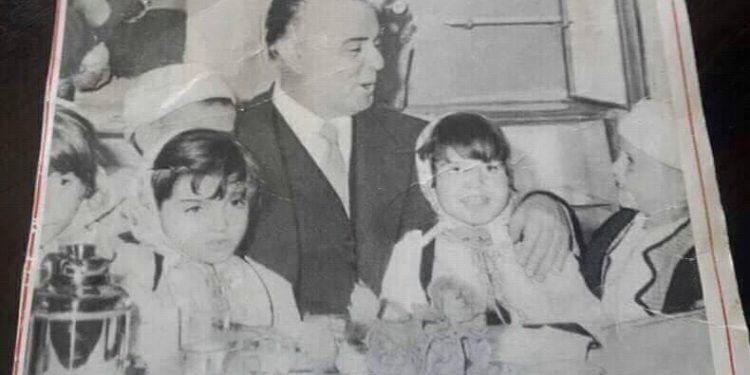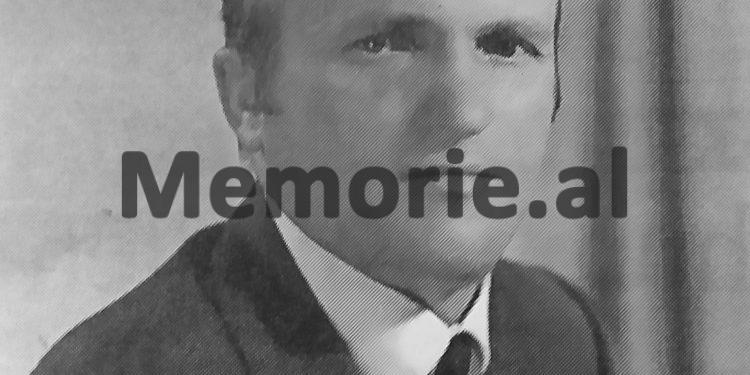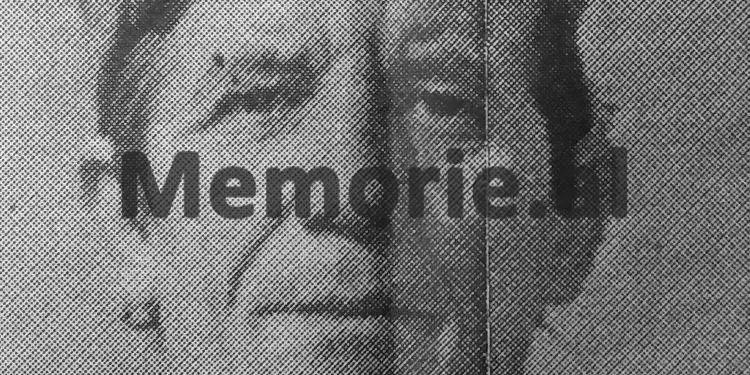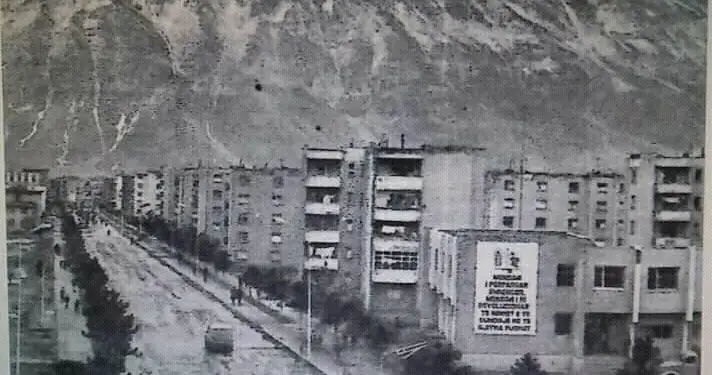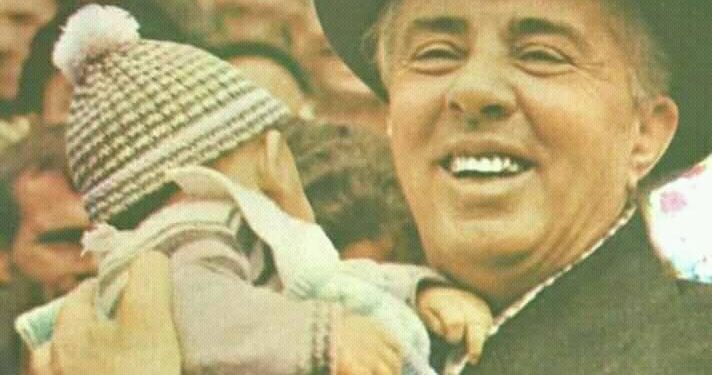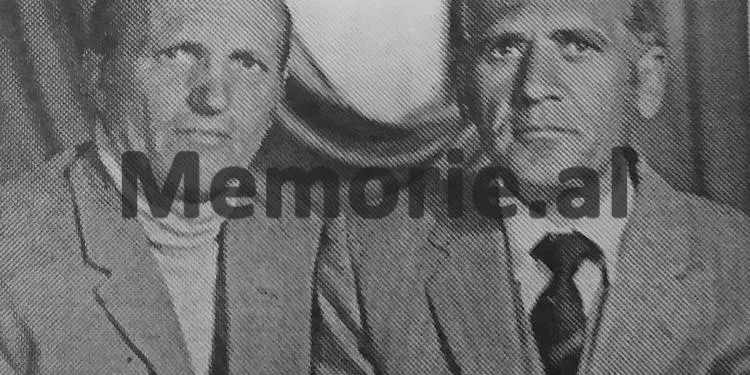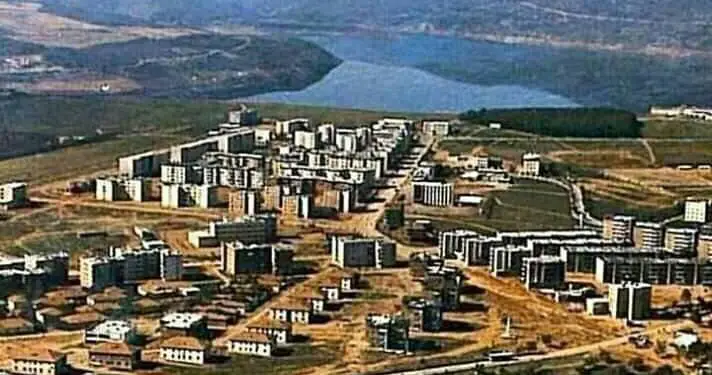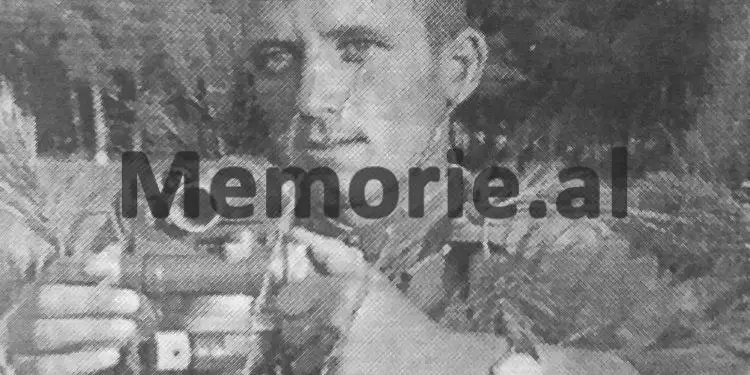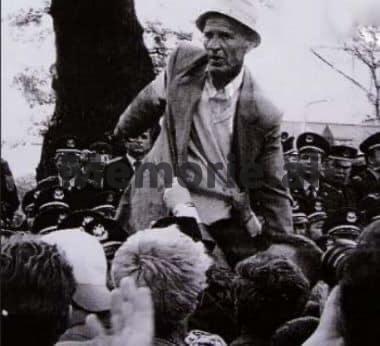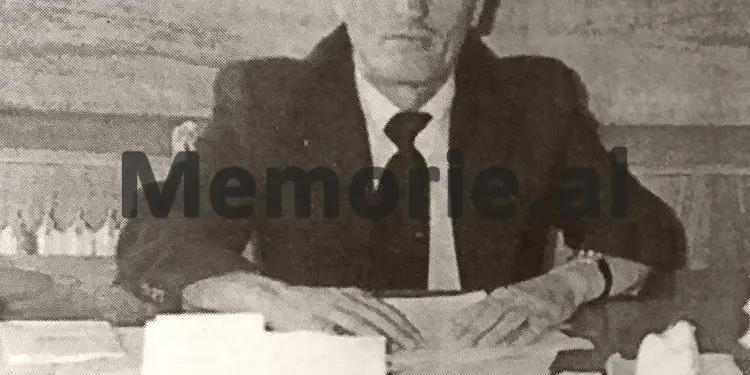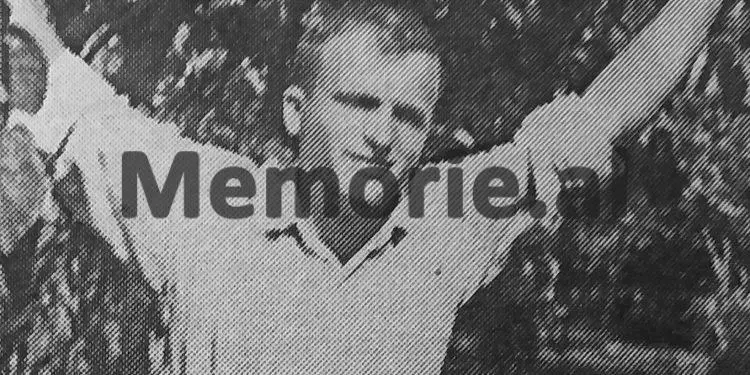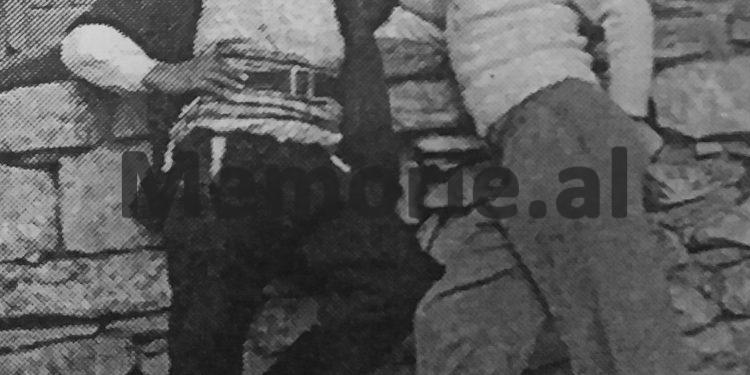Dashnor Kaloçi
Second part
Memorie.al publishes the unknown story of three teachers from the village of Bicaj in the district of Kukës, Avdi, Shefqet and Xhevat Gjana, cousins to each other, who in the early 60’s when they served as teachers in the remote villages of that area, began to talk about the extremely difficult economic situation and the extreme backwardness in which is that mountainous province where they were appointed after studies, suffering a great disappointment since the first steps of their lives. Xhevat Gjana’s rare testimony about political conversations with his cousins: Avdi, Shefqet and Bajram Gjana, as well as with Shemsi Domin and Muharrem Selmani, who after much discussion, decided to take concrete action against the communist regime of Enver Hoxha, planned three variants: where the first was for a quick attack on Radio Kukes, from where the people would then call for an armed uprising to overthrow the popular power, the second to organize volunteer detachments for a revolt during the period of the whole district, attacking state institutions and offices with weapons, and the third for a possible assassination attempt on Enver Hoxha, which would destabilize the situation by causing turmoil. Expansion of the group with the radiologist of the Kukës hospital, Raif Elezi and the poet Hafi Nela who served as a teacher in the village of Topojan, who were ready to start concrete actions, but their conversations were revealed by the State Security and they arrested in 1970 and tried in the city of Kukes, sentenced to severe imprisonment for terrorist acts.
“Apart from the option of taking over Radio Kukës through an armed attack and issuing a call through it, another way we had thought about overthrowing the government was to organize an armed revolt, with by trusted and chosen people, in the volunteer detachments during the development of the slopes, extending it to all areas of the Kukës district, of which we were acquainted. I personally talked about this with Havzi Nela (the dissident poet who was hanged on a rope in 1988, in the middle of the town of Kukës), while we were both teachers in the village of Topojan. Havziu welcomed my proposal very well and was ready for further action. While the third and last variant that we had thought could bring about the overthrow of the communist regime, was that of the assassination of Enver Hoxha, by means of an assassination, which would automatically bring destabilization of the political situation and change the course of events in Albania”. The man who speaks and testifies for Memorie.al, is Xhevat Gjana, originally from the village of Bicaj in Kukës, who tells the story that happened to him in the mid-60s, when he served as a mathematics teacher in the villages of Kukës, an event which changed the course of his life and crashed for years into the prisons of the communist regime in the deep galleries of Spaç and the horrible cells of Burrel.
Continued from the previous issue
Mr. Xhevat, did Shefqeti really intend to shoot Enver Hoxha during his visit to Kamza and Bathore?
I cannot say that the idea to assassinate Enver, was born spontaneously to Shefqet. For that idea, in principle, we had talked to him since we were students in Shkodra, where, among other things, Shefqeti had told me: “We must be physically eliminated with an assassination attempt, Enver Hoxha.”
How did you respond to Shefqet?
I reinforced the idea for him by saying, “If we can, we can undermine and blow up the whole Central Committee.” Even in other discussions, Shefqeti had told me that Enver should be killed, after he had sold Kosovo. But coincidence brought Shefqet the opportunity to act on what we had talked about long ago, before he became a soldier.
Did Shefqet tell that story to anyone other than you?
He told this story to his cousin Islam Spahiu, who rebuked him, telling him why he had not told him this before!
What else did you talk to Shefqet when he came home with permission?
The first thing we talked about was the escape to Yugoslavia, because in those days, the State Security had arrested the radiologist of the Kukës hospital, Raif Elezin, with whom we had also talked about the armed attack on Radio Kukës. His arrest shocked and frightened us a lot, so we planned to escape, but Avdi Gjana refused to come with us. After Raif, another doctor from Kukës, Muharrem Selmani, was arrested, who said that the emancipation of women was nothing but ’emancipation’. After him, my first cousin, Bajram Gjana, was arrested, who had tried political prisons before. Bajrami was accused of having ties with the fugitive Tahir Hajdari, who was said to be coming to Albania as a saboteur.
What about you when you were arrested?
I was arrested on April 19, 1969, while conducting a military flight in Gjegjan, Kukës.
What were the charges against you when you were arrested?
The accusation communicated to me was: “Hostile activity against popular power”.
At that time did you feel that you would be arrested?
Without a doubt, I was waiting for the arrest, because as I said above, some of our comrades had been arrested before me, with whom we had talked and talked a lot against the communist government in Albania, and so the State Security was enough to make the connection about who the people were. associating with those who had been arrested, it was not difficult for him to put his finger on me. Also, one of the other reasons I was awaiting arrest was the Security surveillance of us at every step we took. For this reason, as I told you a little above, we thought of escaping, but we could not do this because Avdi Gjana did not want to.
How long were you kept in the investigator, who was your investigator and what were you asked about?
I was detained by the Kukes Internal Affairs Branch for about 13 months and my investigator was Hulusi Proda. In addition to the many questions I was asked by the investigator, there was also that of the armed attack on Radio Kukës. This came after Raif Elezi had accepted that accusation, from the tortures they had done to him.
What did they ask you about Radio Kukës and did you accept that accusation?
Initially, my investigator asked me what was the detailed plan we had made to take over Radio Kukës and who were the people we had planned to activate during that action. I did not accept that accusation, telling them that we had given up on that plan. But then they started asking us about all that we had talked about with each other. In a word, everything we had talked about against the communist government of Enver Hoxha, came out to us in the investigator and we had no choice but to accept them.
What else were you accused of?
The only thing we did not do and they accused us in vain, was to liaise with foreign agencies and take tasks from them. Likewise, the fabricated accusation that did not stand was what we were told that we were allegedly connected and met with the saboteur Tahir Vata, about whom rumors were circulating that he entered and left Albania whenever he wanted.
But after you, who was arrested?
My two cousins, Avdi and Shefqet Gjana, were also arrested after me, and the investigator, Islam Spahiu, was called.
Did you accept the accusations made against them and did they confront each other during the investigation?
After many investigative hearings, we accepted all the accusations made against us, “for the overthrow of the popular power in Albania”. While the confrontations made us very frequent and when they asked us about acts we had intended to do, they also asked us about the assassination we had planned against Enver Hoxha.
Did Shefqeti admit during the investigation that he wanted to shoot Enver Hoxha?
Shefqeti accepted the accusation made against him in connection with the assassination of Encer Hoxha, but he said that he had it only as an opinion, but he had never raised his weapon to shoot at him. He admitted this even during the confrontations that took place between us. While I did not accept that, telling the investigators that if he had thought of shooting Enver, Shefqeti would have shot, when he was given the opportunity on the terraces of Bathore in Koder – Kamza. My investigator was angry with those words and said: “Hey, big trouble, they say this, the lord sells it, the tellall gives it”?! But even though Shefqeti admitted that he had intended to shoot Enver Hoxha, there was a great deal of confusion and the investigators got into trouble, not knowing in which article to include that event, in terror, or any other article. Likewise, for us, they did not know where to put us, in a group and collaborator with Shefqet, or in not reporting a crime?!
Did your arrest cause a stir in the district of Kukës and did the Security greatly propagandize your group?
After our arrest, the State Security, in cooperation with the Front organization, went from village to village, making great propaganda for the discovery and capture of us and exposing us for our activity. Among other things, they told the people that: ‘we had planned a coup against the main leader of the Party’.
Only in the investigation of Kukës were they kept for the investigation process?
In Kukës we were detained for a little over a year, then we were all sent to the Tirana investigation, to “Ward 313”. They took us from Kukës to Tirana only when the problem of Shefqet’s assassination of Enver Hoxha arose.
When they were brought to Tirana, who were the investigators assigned to your group?
In Tirana we were assigned a special group of investigators, headed by Koço Josif. This group of investigators also included Dhimitër Shkodrani, Florian Kolaneci, Fejzi Aloçi, Pelivan Luçi, Iljaz Haxhiu, and others I do not remember.
How did the investigators treat you during the investigation process?
They have treated us in the most barbaric way, torturing us so much that I do not know how to describe them. To better understand what they did to us, I am telling you that at the end of the investigation, Muharrem Selmani, Bajram Gjana, Avdiu and Raif Elezi, were in a state of deep depression.
In the investigation conducted in Tirana, did you have confrontations and conflicts with each other?
We also had confrontations in Tirana, but the only conflict that happened to us was with Avdi Gjana, who, due to torture, initially accepted the meeting with the saboteurs, but then rejected it.
Without any of the senior heads of the Ministry of Internal Affairs, did he meet with you during the investigation?
Posi, during the investigation, the Deputy Minister of Interior, Feçorr Shehu, the Deputy General Prosecutor, Dhori Panariti and Ferhat Matohiti, one of the Chiefs of Investigation, came to meet me personally.
What did they ask you?
Feçorr Shehu told me that for the arrest of our group, initially they were very reluctant, as some of us had good biographies and families of martyrs. After that, he asked me to show all the activity we had and offered me the cooperation with the State Security. After I categorically refused to cooperate with the Security, making all sorts of excuses, he asked me to admit that I had met the saboteur Tahir Hajdari, but I did not accept that either because it was not true.
When did the investigation against you end and what were you accused of?
Our investigation ended in March 1970 and we accepted all the accusations made against us, such as: “agitation and propaganda”, “hostile activities for the violent overthrow of the popular power”, “the plan to attack Radio Kukës”, “The plan for the assassination of Enver Hoxha”, “internal movements according to the methods of Liu Shao Çia”, etc.
Did you accept the plan for the assassination of Enver Hoxha?
That accusation was also accepted by us, but the investigator himself rejected it, telling us that there was no need to mention it in court. As we later learned, after the 1990s, when Kadri Hazbiu reported at a meeting of the Politburo, saying: ‘there are people who think of killing the main leader of the Party’, Enver objected by saying that nothing stood, as the people loved him, and that thing could stand, only if any of the group was affiliated with foreign agencies. (This was also written by the former chief investigator of that time, Qemal Lame, in the book “People’s Justice”). In those days, Enver had paid a visit to the district of Shkodra, where he had also talked about a policy of easing with Yugoslavia, and based on this fact, the accusations against us regarding the Yugoslav agencies were automatically dropped. So were the accusations for the assassination of Enver Hoxha, but in the Koder-Kamza ward where Shefqeti was a soldier, six or seven officers were fired and transferred, including the Chief of Staff, Bajram Deda.
When and where was the trial against you and who led that trial?
The trial against us took place on March 6-7 and 8, 1971 in the cinema hall of the city of Kukës and with open doors and a sound center and speakers, so that the whole city could hear. But before telling you about the trial, I wanted to add that, during the trip from the Tirana investigator to the old Kukës, we were taken under very strict security measures, with military vehicles and soldiers of the Republic Guard, to who were armed with light and heavy machine guns. Also, from Tirana to Kukës, we were accompanied by our entire group of investigators. The chairman of the court was Shefqet Muçi (in the early 1990s he became Minister of Justice), while the prosecutor was Avdi Gashi.
How many defendants were you in that trial and did you accept the charges?
There were eight of us: me, Shefqet Gjana, Avdi Gjana, Bajram Gjana, Raif Elezi, Muharrem Sulejmani, Shemsi Domi and Has Visha. With the exception of Has Visha who was a farmer, all the rest of us were intellectuals with high schools. On the third day of the trial, we were unmasked publicly, where representatives from all mass organizations (Democratic Front, Trade Unions, Albanian Working Youth Union, Women’s Organization, Veterans Organization, etc.) spoke. intended to terrorize the people and at the end of the trial, although we accepted all the accusations, in the last word we did not ask for mercy, but justice.
How much did they punish you?
I was sentenced to 8 years in prison, to 8 years and Shefqeti, Bajrami 13 years, Avdiu 9, Raifi 13 years, Muharrem 3 years, Shemsiu 6 and Has Visha 8 years. Raif Elezi was considered the leader of the group, which for many years would be known as the “Kukes Group”. After the sentence was handed down, none of us tried to appeal and we suffered all the years of the sentence in Spaç and Burrel, without gaining a single day of amnesty reductions. At the end of this interview, I wanted to add that a month after our sentence, Enver Hoxha paid a visit to the district of Kukës, where, among other things, he said: “Do not let your boys make mistakes”!
Shefqet Gjana: Why didn’t I shoot at Enver
Regarding the event of Enver Hoxha’s visit to the area of Koder Kamza and Bathore in 1967, for which the soldier Shefqet Gjana was accused of carrying out the assassinations, and for this reason he spent 8 years in political prison, today at the age of 64 he testifies exclusively to the newspaper.
It was June 1967, and I was doing military service in the anti-aircraft regiment unit in Koder Kamza. The platoon officer Halit Gjeci (who in 1992-1997 would become Commander of the Republic Guard) sent me as a shift manager to the opening point that was above the Agricultural Institute. I exchanged there, with a soldier who was ill, and climbed to the spot in his place. A few minutes after I received the service, a soldier came to me and told me that Enver Hoxha was coming to see the terraces that had been planted there in Bathore. The place where he was going to be, was not more than 50 meters from where I was standing. At that moment I thought of realizing what I had long dreamed of. I thought of shooting Enver and then shooting myself. While the clock struck 11.00 noon and the first people who were preceding Enver Hoxha’s motorcade were coming, I was seized with strong emotions. At that moment I got ready the “Kalashnikov” automatic, which, I removed the fuse and put a cartridge in his mouth ready to shoot. Although he was not more than 50 meters away, I could only distinguish Enver from his republican hat as he was surrounded by the crowd of people who accompanied him. But the many people who accompanied him made it almost impossible for me to shoot at him, even though I had a clear field of vision. After a few minutes, Enver and the large group of people accompanying him left the direction of the terraces. Thus, ended this episode which, had been an impossible mission for me. A few days after that visit in the presence of 20 soldiers and the commander of the group, Officer Halit Gjeci, whom I emphasize was extremely liberal, I nervously stated that Enver Hoxha was much worse than Hitler because he was killing his people. At this moment a friend of mine, Sitki Spahiu, approached me and closed my mouth. But for the sake of truth that discussion was closed there and none of those present around me denounced me. Then I got permission and went to the house of my cousin Xhevat Gjana, who was fired as a teacher. In the discussion we remembered the moment of the assassination of Senator Robert Kennedy in the US, and suddenly Xhevati said to me “but how did no one come out to kill this Enver Hoxha”?! At this moment I told him about the event of his visit to Kamër Hill and the desire I had to carry out an assassination attempt on him. After I finished my speech, he declared to me “if you had done this, you would have gone down in history, while the rest of us would have been exterminated by tribe and seed”. As long as I was a soldier, this episode was never made public, but years later while I was working as a teacher in Bushtricë, a considerable group of 7 people were arrested who were accused of carrying out an armed uprising. , and that they would attack with weapons the building of Radio Kukës.In this group was arrested my uncle’s son, Xhevati, who during the torture was forced to tell the State Security officers, the story of the episode of Enver Hoxha’s visit to Kamza and Bathore.After this testimony, I was arrested and me and our whole group, was transferred from the Internal Branch of Kukes, to the Internal Directorate of Tirana. During the tortures, many parts of my face and body were damaged, but I only accepted the idea that I had had to assassinate Enver Hoxha, but I had not raised my weapon against him. /Memorie.al




